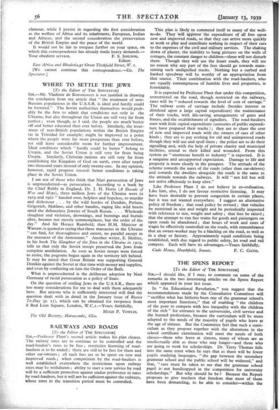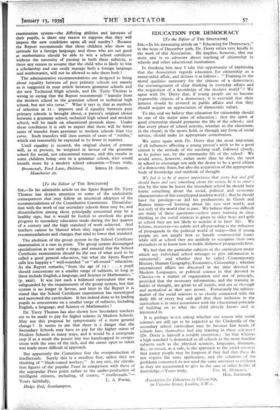THE SPENS REPORT • [To the Editor of THE SPECTATOR]
SIR,—I should like, if I may, to comment on some of the remarks in the two interesting articles on the Spens Report which appeared in your last issue.
In " An Educational Revolution," you suggest that the recommendations made by the Consultative Committee will " sacrifice what has hitherto been one of the grammar school's most important functions," that of enabling " the children of the poor to compete with less inequality with the children of the rich " for entrance to the universities, civil service and the learned professions, because the curriculum will be more adapted to the needs of the majority of pupils who leave at the age of sixteen. But the Committee feel that such a curri- culum as they propose together with the alterations in the school certificate examination will meet the needs of both classes—those who leave at sixteen, many of whom are as intellectually able as those who stay longer—and those who are going to work for scholarships. Dr. Terry Thomas falls into the same error when he says that as there will be fewer pupils studying languages, " the gap between the secondary grammar school and the public school will be widened," and that, " care must be taken to see that the grammar school pupil is-not handicapped in the competition for university scholarships." But why should he be ? Because the Report proposes to give teachers that freedom that most of them have been demanding, to be able to consider—within the examination system—the differing abilities and interests of their pupils, is there any reason to suppose that they will impose the new conditions upon all and sundry ? Because the. Report recommends that those children who show no aptitude for a foreign language, and those who are not good at mathematics should be able to win a school certificate without the necessity of passing in both these subjects, is there any reason to assume that the child who is likely to win a scholarship and can easily manage both a foreign language and mathematics, will not be allowed to take them both ? '
The administrative recommendations are designed to bring about equality between all post primary schools not merely as is suggested in your article between grammar schools and the new Technical High schools, and Dr. Terry Thomas is wrong in saying that the Report recommends " transfer from the modern school to the grammar school or technical high school, but not vice versa." What it says is, that as methods of selection at II + improve and if equality between post primary schools is brought about, a parent's original choice between a grammar school, technical high school and modern school, will be made on educational grounds alone. Under these conditions it is safe to expect that there will be fewer cases of transfer from grammar to modern schools than vice versa. Such transfers will then consist of cases of " misfits," which can reasonably be expected to be fewer in number.
Until equality is secured, the original choice of parents will, as at present, be weighted in favour of the grammar school for social, not educational reasons, and this results in some children being sent to a grammar school, who would benefit more by a modern school education.—Yours truly,
Broomcroft, Ford Lane, Didsbury, SHENA D. SIMON.
Manchester 20.







































 Previous page
Previous page